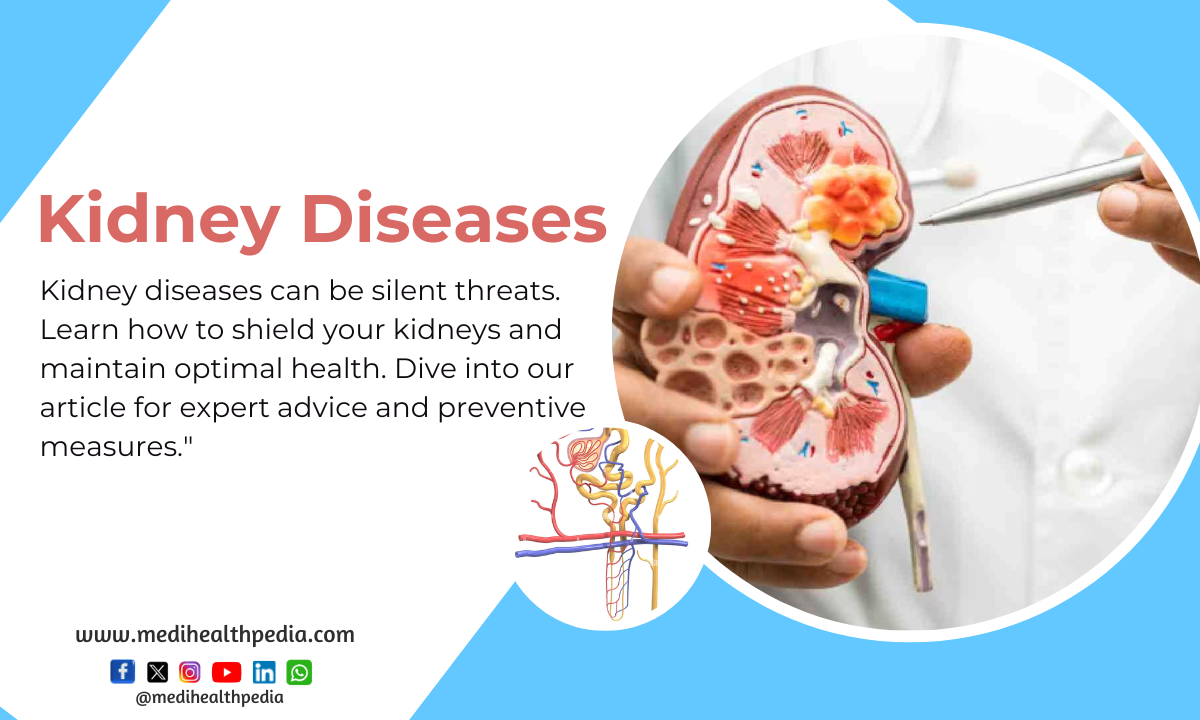10 Global Facts About Kidney Diseases that Everyone Should Know: Revolutionary Approaches to Prevent Kidney Diseases
Introduction
Kidney diseases are a serious health concern affecting millions of people worldwide. These crucial organs play a vital role in filtering waste products and excess fluids from the blood, maintaining electrolyte balance, and producing hormones. Understanding kidney diseases, their causes, symptoms, and prevention strategies is essential for maintaining optimal kidney health and overall well-being.

Understanding Kidney Diseases
- The role of kidneys: The kidneys are bean-shaped organs located on either side of the spine, just below the rib cage. They consist of millions of tiny filters called nephrons, which remove waste and toxins from the bloodstream.
- Nephrons: These microscopic units within the kidneys perform the task of filtering the blood, reabsorbing essential substances, and excreting waste products as urine.
- Urinary system: The kidneys are part of the urinary system, working in conjunction with other organs such as the bladder, ureters, and urethra to eliminate waste.
- Common kidney diseases: There are various kidney diseases that can impair the normal functioning of these vital organs, including:
- Chronic Kidney Disease (CKD): This progressive condition involves the gradual loss of kidney function over time, often as a result of underlying health conditions such as diabetes or high blood pressure.
- Acute Kidney Injury (AKI): AKI occurs suddenly and is often caused by factors like severe infections, dehydration, or certain medications.
- Kidney stones: These are solid deposits that form in the kidneys, resulting in sharp pain and potential blockage of the urinary tract.
- Polycystic Kidney Disease (PKD): PKD is a genetic disorder characterized by the growth of fluid-filled cysts in the kidneys, leading to kidney enlargement and impaired function.
Major Kidney Diseases: Causes & Symptoms
- Chronic Kidney Disease (CKD):
- Causes: Common causes of CKD include diabetes, high blood pressure, glomerulonephritis (inflammation of the kidney’s filtering units), and certain autoimmune diseases.
- Symptoms: Early stages of CKD may not display noticeable symptoms, but as the disease progresses, individuals may experience fatigue, fluid retention, decreased urine output, muscle cramps, and shortness of breath.
- Acute Kidney Injury (AKI):
- Causes: AKI can be caused by severe infections, low blood flow to the kidneys, inflammation, or certain medications that damage kidney tissue.
- Symptoms: Symptoms of AKI may include decreased urine output, swelling in the legs or ankles, fatigue, confusion, nausea, and seizures in severe cases.
- Kidney stones:
- Causes: Kidney stones form when certain substances, such as calcium, oxalate, and uric acid, accumulate and solidify in the kidneys. Dehydration, certain diets, and certain medical conditions can increase the risk of developing kidney stones.
- Symptoms: Symptoms of kidney stones may include severe pain in the back or side, blood in urine, frequent urination, and a persistent urge to urinate.
- Polycystic Kidney Disease (PKD):
- Causes: PKD is caused by genetic mutations that affect the growth and development of kidney cysts.
- Symptoms: PKD symptoms may include abdominal pain, high blood pressure, blood in urine, frequent infections, and kidney stones.
Global Facts
- 10% of the population worldwide is affected by chronic kidney disease (CKD), and millions die each year because they do not have access to affordable treatment.
- According the 2010 Global Burden of Disease study, chronic kidney disease was ranked 27th in the list of causes of total number of deaths worldwide in 1990, but rose to 18th in 2010. This degree of movement up the list was second only to that for HIV and AIDs.
- Over 2 million people worldwide currently receive treatment with dialysis or a kidney transplant to stay alive, yet this number may only represent 10% of people who actually need treatment to live.
- Of the 2 million people who receive treatment for kidney failure, the majority are treated in only five countries – the United States, Japan, Germany, Brazil, and Italy. These five countries represent only 12% of the world population. Only 20% are treated in about 100 developing countries that make up over 50% of the world population.
- More than 80% of all patients who receive treatment for kidney failure are in affluent countries with universal access to health care and large elderly populations.
- It is estimated that number of cases of kidney failure will increase disproportionately in developing countries, such as China and India, where the number of elderly people are increasing.
- In middle-income countries, treatment with dialysis or kidney transplantation creates a huge financial burden for the majority of the people who need it. In another 112 countries, many people cannot afford treatment at all, resulting in the death of over 1 million people annually from untreated kidney failure.
- In the US, treatment of chronic kidney disease is likely to exceed $48 billion per year. Treatment for kidney failure consumes 6.7% of the total Medicare budget to care for less than 1% of the covered population.
- In China, the economy will lose US$558 billion over the next decade due to effects on death and disability attributable to heart disease and kidney disease.
- In Uruguay, the annual cost of dialysis is close to $ US 23 million, representing 30% of the budget of the National Resources Fund for specialized therapies.
- In England, according to a recent report published by NHS Kidney Care, chronic kidney disease costs more than breast, lung, colon and skin cancer combined.
- In Australia, treatment for all current and new cases of kidney failure through 2020 will cost an estimated $12 billion.
Prevention Strategies
Preventing kidney diseases is crucial for maintaining optimal kidney function and overall health. Here are some effective strategies to reduce the risk:
- Stay hydrated: Drinking an adequate amount of water helps to flush out toxins and prevent the formation of kidney stones. Aim to drink at least 8 glasses of water per day.
- Maintain a healthy blood pressure: High blood pressure can damage the kidneys over time. Monitor your blood pressure regularly and follow a balanced diet, low in sodium and rich in fruits, vegetables, and whole grains, to keep your blood pressure under control.
- Manage diabetes: Diabetes is a leading cause of kidney disease. By effectively managing blood sugar levels through diet, exercise, and medication, individuals can significantly reduce the risk of kidney complications.
- Avoid excessive use of over-the-counter pain medications: Certain pain medications, such as nonsteroidal anti-inflammatory drugs (NSAIDs), can cause kidney damage when used in excess or for prolonged periods. Use them sparingly and as directed by a healthcare professional.
- Quit smoking: Smoking can worsen kidney disease and decrease kidney function. Quitting smoking not only benefits kidney health but also overall well-being.
Kidney-Friendly Diet
Maintaining a kidney-friendly diet is essential for individuals with kidney disease or those at risk. Consider the following dietary recommendations:
- Limit sodium intake: High sodium consumption can lead to fluid retention and increased blood pressure. Opt for fresh, low-sodium foods, and limit processed and packaged foods.
- Control protein intake: Consuming excessive amounts of protein can put strain on the kidneys. Follow a balanced diet with moderate protein intake, considering high-quality sources such as lean meats, poultry, fish, eggs, and dairy products.
- Monitor phosphorus and potassium: Individuals with kidney disease may need to reduce phosphorus and potassium intake. Avoid foods high in these minerals, such as processed meats, dairy products, nuts, and certain fruits.
- Stay mindful of fluids: Individuals with kidney disease may need to restrict their fluid intake, especially if experiencing fluid retention. Consult with a healthcare professional to determine the appropriate fluid intake for your situation.
Natural Ingredients for Kidney Diseases
Kidney diseases are a significant health concern affecting millions of people worldwide. These conditions, which can range from mild to severe, can impair the functioning of the kidneys, leading to various complications and even renal failure. While medical intervention is vital in managing kidney diseases, incorporating natural ingredients into our daily routines can play a significant role in preventing these ailments and supporting kidney health. In this article, we will explore some potent natural ingredients that have shown promising effects in preventing kidney diseases.
Antioxidant-Rich Foods
Oxidative stress plays a detrimental role in the development and progression of kidney diseases. Antioxidants, which combat the harmful effects of free radicals, are essential for maintaining optimal kidney health. Including antioxidant-rich foods in our diet can effectively reduce the risk of kidney diseases. Here are some remarkable options to consider:
Berries
Berries, such as blueberries, strawberries, and raspberries, are packed with antioxidants like anthocyanins and vitamin C. These potent compounds help neutralize free radicals, thus safeguarding the kidneys against oxidative damage. Incorporating a variety of berries into our diet can enhance renal function and minimize the risk of kidney diseases.
Red Grapes
Red grapes contain powerful antioxidants, including resveratrol and quercetin, which possess anti-inflammatory and kidney-protective properties. Regular consumption of red grapes or their juice can potentially lower the risk of kidney damage and maintain healthy renal function.
Turmeric
The vibrant yellow spice, turmeric, has gained immense popularity in recent years, and for a good reason. Its active compound, curcumin, exhibits strong antioxidant and anti-inflammatory properties. Studies have suggested that incorporating turmeric into our diet can mitigate kidney inflammation and prevent the progression of kidney diseases.
Herbal Support
Nature has bestowed us with numerous herbs that offer exceptional support for kidney health. These natural ingredients have been used for centuries in traditional medicine and are now gaining recognition for their beneficial effects on renal function. Let’s delve into a few of these remarkable herbs:
Dandelion Root
Dandelion root, known for its diuretic properties, helps promote kidney function by increasing urine production and eliminating toxins from the body. Additionally, it contains essential nutrients like potassium, which aids in maintaining optimal electrolyte balance. Incorporating dandelion root tea or supplements into our routine can effectively support kidney health.
Milk Thistle
Milk thistle, a flowering herb, is renowned for its liver-protective properties. However, its benefits extend to kidney health as well. This herb contains an active compound called silymarin, which exhibits potent antioxidant and anti-inflammatory effects. Regular consumption of milk thistle can aid in reducing oxidative stress and inflammation in the kidneys, thus protecting them from damage.
Hydration and Kidney Health
An often overlooked aspect of kidney disease prevention is proper hydration. Water is vital for maintaining overall health, but it plays a particularly crucial role in kidney function. Here’s why:
- Hydration helps flush out toxins and waste products from the kidneys, minimizing their accumulation and potential damage.
- It supports the optimal filtration and excretion processes, ensuring the kidneys can effectively eliminate waste from the body.
- Ample hydration helps prevent the formation of kidney stones, a common kidney-related ailment.
Whether it’s plain water or hydrating foods like cucumber and watermelon, prioritizing hydration is essential for kidney health.
Conclusion
Maintaining healthy kidneys is vital for overall well-being. By understanding kidney diseases, their causes, symptoms, and implementing effective prevention strategies, individuals can take control of their kidney health. Incorporating a kidney-friendly diet and adopting a healthy lifestyle, including regular exercise, can go a long way in safeguarding these essential organs. Remember, early detection and timely management of kidney diseases can make a significant difference in preserving kidney function and enhancing quality of life. Stay proactive and prioritize your kidney health for a healthier future.

